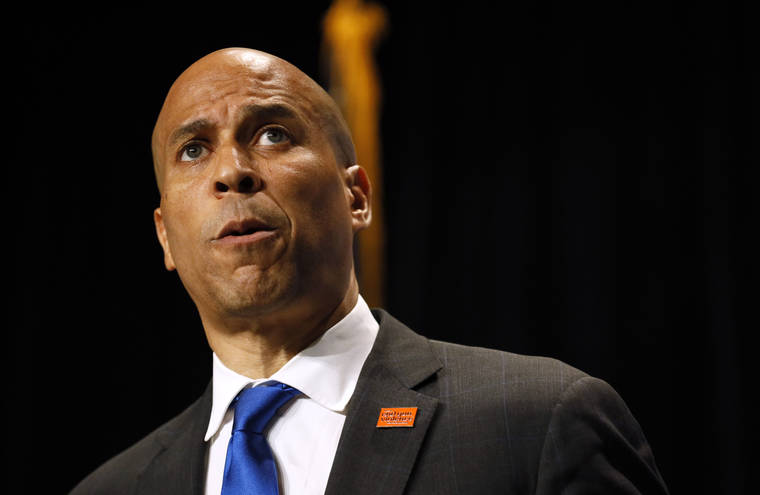WASHINGTON — Cory Booker’s supporters have spent months waiting for a moment when the charismatic senator could break through a crowded field of Democratic presidential candidates. That opening came when Joe Biden clumsily talked about segregationists, prompting Booker to push back at his 2020 rival to great effect.
The New Jersey senator called on Biden to apologize Wednesday after the former vice president nostalgically referenced the “civility” he maintained during his time in the Senate with two segregationist Democrats in the 1970s despite their vast distance in ideology. After Biden pushed back, saying Booker should apologize to him because the senator “knows better,” Booker called for the Democratic Party to choose a presidential nominee who can be “sensitive” to the “hurt and pain” caused by Biden noting that the two senators had called him “son” instead of “boy,” a reference to the racist way many whites addressed black men at the time.
Biden called Booker on Wednesday night about the matter, but tension between the two Democrats continued into Thursday. During the call, “Cory shared directly what he said publicly,” Booker spokeswoman Sabrina Singh said in a statement. “Cory believes that Vice President Biden should take responsibility for what he said and apologize to those who were hurt.”
The schism between the two candidates, who at times offer a similar emphasis on collaboration with the GOP despite mounting polarization under President Donald Trump, promises to reverberate this weekend in a pivotal early voting state. They are the final two hopefuls set to speak to the South Carolina Democratic Party during its 21-candidate convention on Saturday.
Booker, 50, has languished in the middle tier of candidates in the early months of the race, but some strategists looked to his confidence in taking on Biden, 76, as the beginning of a potential boost.
“Cory’s argument is very poignant, and it is ‘Why should we be spending time teaching any nominee’ — but let’s focus on Joe Biden — ‘what it means to be conscious about race?’” said Quentin James, co-founder of Collective PAC, which boosts African American candidates in federal and statewide offices.
Booker’s campaign message “has been about love” and unity, James added. “That’s fine. But we also want to see a little fight from Cory.”
For Booker and his advisers, however, a willingness to engage in meaningful fights always has been on the agenda. One person close to Booker’s campaign, speaking on condition of anonymity to discuss internal dynamics, said Thursday that Biden crossed a line with his lack of an apology for recalling that the Senate “got things done” even with white supremacists, making this week’s battle an easy one to pick.
Whether the tension continues in South Carolina this weekend remains to be seen. Booker has maintained one of the sprawling Democratic field’s largest footprints in South Carolina, home of the first Southern primary and the first state in which candidates can make their cases before an audience of mostly black primary voters.
Even so, Biden has maintained a foothold in South Carolina that could prove stronger than his lead in national polls, thanks to his appeal to older black voters who connect with him as former President Barack Obama’s No. 2. That both men are selling themselves as bridge builders with a more optimistic message could further complicate Booker’s path to translating his pushback to an advantage over Biden.
“Biden is sort of co-opting his theme,” Audrey Haynes, a political scientist at the University of Georgia, said in a recent interview. “Biden has always been a ‘bring it together’ kind of guy, so he has more money, was VP to a popular black president, and they had a visible bromance that seemed very authentic.”
Biden’s public stumble over addressing his past relationships with segregationist senators offers a road map for Booker to continue to talk about thorny discussions of race as he works to undercut the white former vice president’s claim to be the most electable Democrat against Trump. Still, Booker isn’t the only black candidate who will get that opportunity this weekend: California Sen. Kamala Harris is also scheduled to speak in South Carolina.
Jalen Elrod, first Democratic Party vice chairman in Greenville County, said in a recent interview before joining Sen. Bernie Sanders’ presidential campaign that Booker may be lagging in support because of Harris’ hard-charging presence and appeal among black women.
As the race moves past next week’s debates, said Elrod, “you’ll get a better sense of where the black community is.”
———
Kinnard reported from Columbia, S.C. Associated Press writer Bill Barrow contributed from Atlanta.


